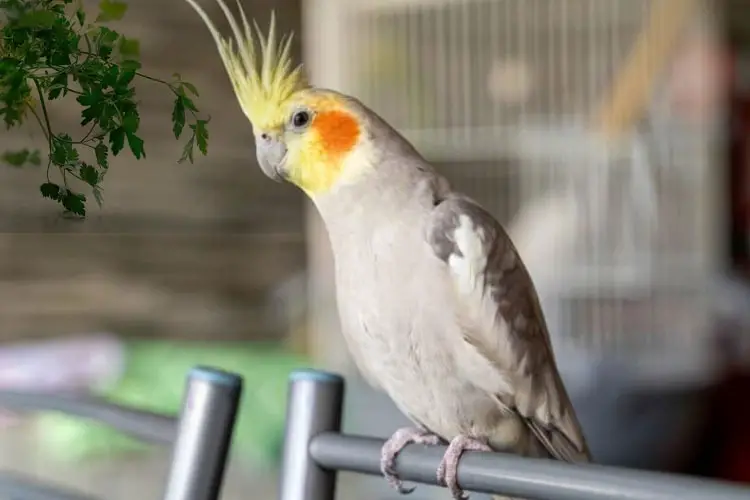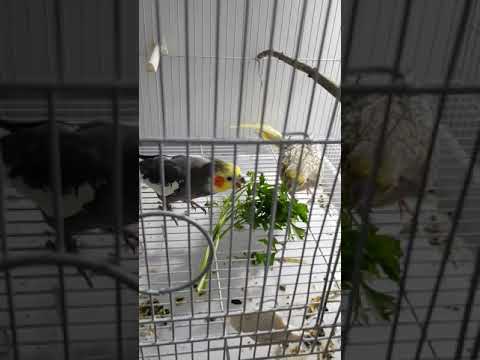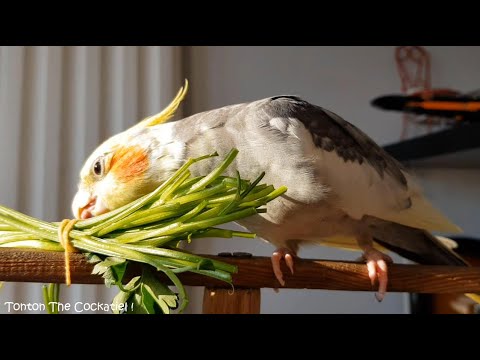Cockatiels are fun-loving birdies who are very energetic for affection and food. They have the habit of nibbling on food particles when they find something interesting. Since they’re also into herbs and leafy goods, you’ve likely noticed your cockatiel nibbling on some of that parsley.
Now, the question stands, can cockatiels eat parsley? Yes, cockatiels can eat parsley as they are fresh herbs and filled with health benefits. However, they shouldn’t eat the stems, and the number of servings should be in moderation as it can cause complications for their digestive system.
Parsley is edible by all cockatiels, but if not careful of the ways, techniques, and precautions of parsley, they might fall in danger. To learn about these aspects, read on.
Can You Feed Parsley to Cockatiels?
Parsley is a beneficial herb or vegetable that comes from the family of Apiaceae, which is mainly a carrot family. It’s high in vitamins and antioxidants and has various health benefits. The same goes for your cockatiels too. Since they’re healthy and full of health benefits, you can feed your pet bird parsley.
The reason why your cockatiel can feed on parsley is that it has high levels of beta carotene and vitamin C. This is good news as vitamin C dramatically boosts the immune system and helps in the growth of eyes in baby bird cockatiels.
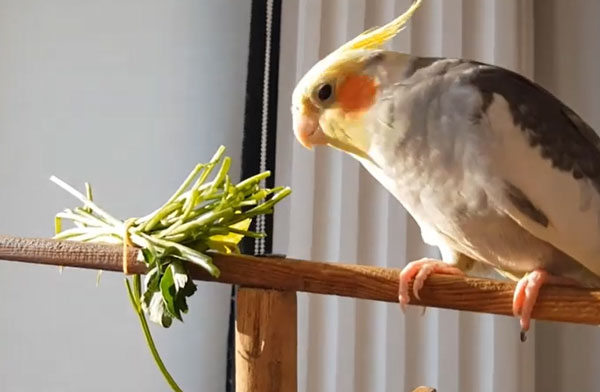
Moreover, parsley also helps in clearing out the respiratory problems of the lungs and loosens heavy mucus buildup.
However, even though parsley can be used as a healthy supplement for your cockatiels, if not fed in moderation, your pet cockatiels can fall in danger.
That’s because Parsleys have calcium-building properties in them. This means the existing calcium in a cockatiel will be blocked and become unavailable to other parts of the body. Thus, your cockatiel might end up suffering from a calcium deficiency.
This happens as Parsley has oxalic acid in it, which is the main source of calcium-binding properties. Hence, if you feed them a bunch of parsley day and night, this will become the only source of nutrients in their body and eliminate the calcium that could build by eating other foods.
The trick to following here is to feed them Parsleys in moderation. If you feed them occasionally in small portions, they will not only receive all the nutrients from the parsley but also be safe from the calcium-binding properties.
It’s good to feed your cockatiels Parsleys, and you should too. However, you have to be careful about the preparation and the number of servings so that they’re safe from getting exposed to health compilations.
Do Cockatiels Like Parsley?
Cockatiels love nibbling on herbs, shrubs, fresh fruits, and leafy goodness. So yes, cockatiels like eating parsley from time to time as it can be a great occasional treat.
Parleys come in both fresh and dried forms. Since cockatiels are mostly herbivorous bird types, they love the distinct herbaceous taste of parley. Not to mention, it also has a flavor that’s bright, fresh, and a little bit bitter. Sprinkling it on top of other snacks can boost the flavor of your cockatiel’s meal to a drastic level.
Not to mention, they like to nibble on herbs and shrubs from time to time. Hence, if they come across parsley leaves, they don’t stop themselves from having a taste.
Health Benefits Cockatiels Eating Parsley
Parsleys are filled with healthy contents and make up for healthy treats, which is why it’s not entirely risky to feed them to your cockatiels from time to time. Some of the health benefits parsley offers your cockatiels are-
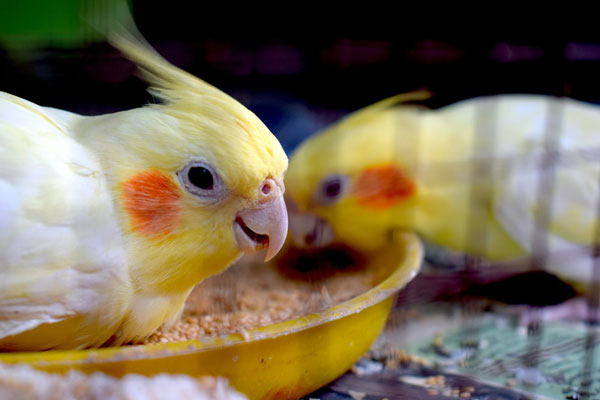
High in Antioxidants
Parsleys are filled with flavonoid antioxidants, which are phenolic substances. This substance helps in driving away everyday toxins from the body.
These antioxidants also help in fighting the free radicals off your cocktails. Free radicals are bad news as they are unstable molecules that tend to damage your bird’s tissue and cell growth.
Rich in Fiber
Parsleys are rich in fiber content, which is very beneficial in clearing out the digestive system. The high fiber content of fresh foods like aromatic herbs helps cockatiels in having better digestion and makes the elimination of stool easier.
Rich in Vitamins
Parsleys have a high content of vitamin C and K, which helps improve the functionality of the eye, bone growth, and immune system.
Vitamin C in Parsleys helps develop eyes in baby cockatiels and protects the eyesight from a slow loss of eyesight.
Improves Respiratory Health
Respiratory health is improved in cockatiels after Parsley is fed. That’s because parsley loosens the build-up of mucus and phlegm, which blocks the respiratory flow.
Elimination of these products helps Cockatiels in breathing easily.
Relieves Gas
Parleys have had clearing abilities, which is very beneficial for the cockatiels. It helps in providing relief to gas buildup to cockatiels that are susceptible to stomach problems.
Stimulates Digestion
This herb is filled with volatile and essential oils, which makes digestion a lot easier. It helps in stimulating digestion and makes the process of food passing easier in the stomach.
Reduces Risks of Cancer
Cockatiels can be exposed to risks of cancers too. Since Parsleys has Antioxidants, it fights the bad particles and reduces the risks of cancer in cockatiels.
Improves Cells Growth
Parsley is also rich in chlorophyll or green components. As a result, the cell growth and regeneration get better due to parley.
Improves Bone Health
Bone health improves drastically after eating parsley as parsley is bright green and filled with chlorophyll. It’s especially good for the baby cockatiels at an early stage who have difficulty walking or making physical movements.
Provides Macronutrients
Parleys have some of the essential macronutrients which include, iron, potassium, calcium, magnesium, phosphorus, thiamine, riboflavin, folate, niacinamide, and zinc.
Provides Calcium
This green herb is high in oxalic acid, which is the main source of calcium. This calcium is very important for cockatiels as they help in muscle contraction, normal heart rhythms, and growth.
Is Parsley Bad for Cockatiels?
Parsley isn’t bad or too toxic for cockatiels if fed in moderation. However, parsley is too high in oxalic acid. This acid is infamous for its calcium-binding properties. If you only feed them Parsleys and leave it as other food, they’ll suffer from deficiency and have a calcium buildup.
Again, feeding them many parsleys can give them diarrhea or stomach cramps as it’s rich in fiber contents.
Anything too much is not good, but if fed in small portions and mixed with other food or snacks occasionally, then your cockatiel will not suffer from any risks but only get healthier.
How much Parsley should Cockatiels eat?
Even though parley is high in antioxidants, vitamins, macronutrients, and essential oils, you can’t feed them too much of it.
Since parley is high in calcium, feeding them too much parsley will throw them at risk and make them sick.
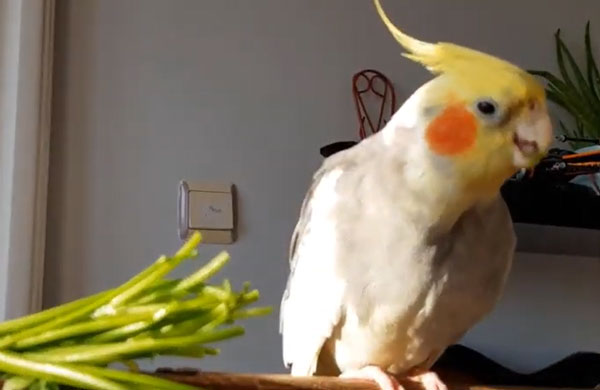
Cockatiels’ diets should mostly contain all types of seeds, nuts, fruits, snacks, vegetables, and leafy greens. Amidst their normal food, you can feed them parleys once or twice a week with snacks. This portion alone is plenty and enough for your cockatiel’s good health.
How Do You Prepare Parsley for Cockatiels?
You have to vary things while preparing Parsleys for your cockatiel. That’s why here’s how you prepare parleys safely for your cockatiels-
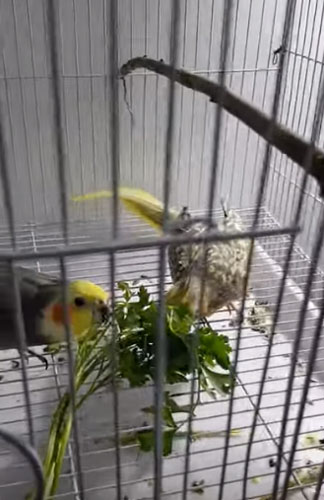
- Wash a small number of parsley leaves thoroughly with water.
- Get rid of the worn-out or blackened leaves as they’re dead and can cause stomach cramps for your cockatiels.
- Cut the stems and any possible seeds out of the parsley as it can cause digestive issues.
- Don’t feed too much in one go and feed them the fresh raw Parsleys.
- Mix it with other snacks and feed them 1-2 times a week in moderation.
Csley to Baby Cockatiels? If so, How?an You Feed Par
Yes, you can feed small portions of parsley to baby cockatiels. However, they can eat it once they’ve turned 8-10 weeks old. Feeding them Parsleys before this time can prove to be fatal.
Since baby cockatiels are delicate and require utmost care, they mostly need seeds or pellets. However, you can feed them 2-3 leaves of parsley by mushing them into other foods. This way is a lot easier and keeps the baby high in nutrient content.
Remember not to feed them any seeds or stems from the parley as it causes heavy harm to them.
Here’s a cockatiel eating Parsley with utmost joy.
Frequently Asked Questions
Yes, parsley is safe for Cockatiels as long as you feed them in moderation. Parsleys are rich in essential nutrients and boost the immune system and fight against diseases. Feeding them 1-2 times a week is safe but try not to feed more than that as it can cause harmful effects to your bird.
Yes, cockatiels can eat dried parsley, and they enjoy it as well. However, make sure to get rid of the stem, dead leaves, and seeds as these can cause major health and digestive issues for your cockatiel.
Final Words
Cockatiels love eating herbs, shrubs, and fruits occasionally. This is why it’s a common thing to think, can cockatiels eat parsley or not. Since parley is a good source of antioxidants, vitamins, and essential nutrients, you can feed your cockatiels parley.
However, it’s not the best food to feed them regularly. Try to feed them Parsleys in small amounts moderately 1-2 times a week, and your cockatiel will be healthy and safe from risks.
Do you know if your cockatiels can eat watermelon or grapes? Read our articles about it to learn more.
